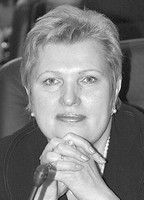Environment-centered approach to university students' physical education competence building process
Фотографии:
ˑ:
Teoriya i praktika fizicheskoy kultury №12 2016, pp. 38-40
UDC 796.011.1
Professor, Dr.Hab. I.V. Manzheley
Tyumen State University, Tyumen
e-mail: mangeley60@mail.ru
The article considers the issues of the updated higher education standards being implemented and the relevant physical education competences being formed in university students in an elective physical education environment. The study offers and discusses an efficient elective physical education environment model, with a special emphasis on its specific requirements and practical implementation specifics. The elective physical education environment will be designed on the following requirements: openness and flexibility (interconnection with the other environments and micro-media; and compliance with the standards and students’ needs); cluster-networking design (transformability, ecological compatibility, authenticity, functional zone interlinks in different clusters); due technological standards (in terms of information processing and integration); and personality-focused design (axiology-sensitive, differentiated, individualized).
Keywords: physical education competence, elective physical education environment, elective courses, integration, information, differentiation, cluster-networking design.
References
- Atanasyan S.L. Teoreticheskie osnovy formirovaniya informatsionnoy obrazovatel'noy sredy pedagogicheskogo vuza (Theoretical basics of formation of information educational environment of teacher training university) / S.L. Atanasyan, S.G. Grigor'ev, V.V. Grinshkun // Informatsionnaya obrazovatel'naya sreda. Teoriya i praktika (Information educational environment. Theory and practice). – Moscow: ISMO RAO, 2007. – Is. 2. – P. 5-14.
- Bal'sevich V.K. Sportivno-orientirovannoe fizicheskoe vospitanie: obrazovatel'ny i sotsial'ny aspekty (Sports-centered physical education: educational and social aspects) / V.K. Bal'sevich, L.I. Lubysheva // Teoriya i praktika fiz. kultury. – 2003. – № 5. – P. 19-22.
- Zagvyazinskiy V.I. Obshchaya panorama pedagogicheskogo issledovaniya po problemam fizicheskoy kul'tury i sporta (Pedagogical research in physical education and sport: Overview) / V.I. Zagvyazinskiy, I.V. Manzheley // Teoriya i praktika fiz. kultury. – 2016. – № 3. – P. 3–5.
- Kudinov V.A. Postroenie informatsionnoy obrazovatel'noy sredy vuza na osnove tekhnologiy upravleniya znaniyami: avtoref. dis. …dokt. ped. nauk (Design of university information educational environment based on knowledge management technologies: Abstract of doctoral thesis (Hab.) / V.A. Kudinov. – Moscow, 2010. 45 p.
- Lubysheva L.I. Kineziologicheskiy podkhod kak metodologiya sovremennoy sportivnoy nauki i praktiki (Kinesiological approach as methodology of modern sport science and practice) / L.I. Lubysheva, A.I. Zagrevskaya // Teoriya i praktika fiz. kultury. – 2015. – № 12. – P. 3-5.
- Manzheley I.V. Sredo-orientirovanny podkhod v fizicheskom vospitanii studentov (Environment-centered approach to university physical education) / I.V. Manzheley // Teoriya i praktika fiz. kultury. – 2005. – № 8. – P. 7-11.
- Smith N. Sovremennye sistemy psikhologii (Modern systems of psychology) / N. Smith; transl. from Engl. ed. by A.A. Alekseev. – St. Petersburg, 2003. – P. 192-208, – P. 325-330.
- Khutorskoy A.V. Kompetentnostny podkhod v obuchenii (Competency building approach in education: study guide) / A.V. Khutorskoy. – Moscow: Eydos, 2013. – 73 p.
Received 30.08.2016 г.




 Журнал "THEORY AND PRACTICE
Журнал "THEORY AND PRACTICE